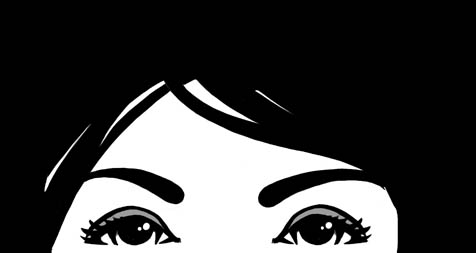When Straights Take Over the Gay-borhood

Last month, my girlfriend, Jackie, and I went on our first vacation together. We went to New York to visit a Santa Barbara friend who moved there to broaden her professional horizons and, for an added bonus, date a few ladies. Despite having lived in Santa Barbara for a good three years, my friend had never really met any dateable gals. The one time she did end up with a girl’s phone number, we were at a club in West Hollywood. After a few pleasant phone conversations, WeHo Woman got a little obsessed and wouldn’t stop calling my friend. Chalk up another failed attempt with the ladies.
But New York would be different. My friend lived in Park Slope in Brooklyn, and practically every travel book Jackie and I read used some variation of the phrase, “Park Slope, or Dyke Slope as it’s referred to because of the high concentration of lesbians, is a lovely brownstone neighborhood :” Plus, two New York natives swore it was lesbian heaven, and one of my coworkers, who lived in the city for seven years, actually said, “You’ll be in paradise; you won’t ever want to come back.”
Could it be true? Lesbians, in herd-like form, taking over an entire part of an N.Y.C. borough? Its reputation alone would have required Jackie and me to make a stop in Park Slope, but we would be making
it our home base for a few weeks; we couldn’t believe our luck. The first morning we were there, I excitedly wiped the sleep from my eyes, put on my best dangly earrings, and bundled up in my warmest clothes: We were going to our first New York brunch and, to make matters infinitely better, there would be lesbians.
Ah, the pang of disappointment: nary a lezzie in sight. In fact, quite the contrary; we were surrounded by straight couples and sat next to two gay fellas who spent a large portion of their morning trying to get their adopted child to say “Dad.”
That, more than lesbians, turned out to be the theme: families. Everywhere we went there were strollers, toddlers, criers, screamers, snotty noses, and Happy Meal toys. My friend, whose chosen career as a writer must be supplemented by more lucrative jobs like babysitting, is living it up with several well-paying gigs per week. And they’re predominantly heterosexual families, who are well-off and hoping to raise their children in the safe streets and good schools of Park Slope.
It’s happened before in other zip codes. Last March, the San Francisco Chronicle described the outrage of many gay and lesbian residents in the Castro, who felt their historic part of town was being taken over by heterosexuals seeking safe neighborhoods in which to raise their children. When I lived in Washington, D.C., a few years ago, Dupont Circle-long known for its hip, gay scene in the midst of the buttoned-up capital-was starting to undergo this trend, with straight couples attracted to the higher-end housing in the area.
In November 2007, the L.A. Times’s Gregory Rodriguez reported that because more people are coming out of the closet, homosexuality is more accepted, so gay enclaves aren’t really a necessity anymore. The gay population is increasingly more diverse, more spread out across the country, and therefore “being gay is not such a big deal.” Or, as a shirt I once saw read, “Gay is the new black.”
Such a shift happened in our fair city not so long ago. Remember the days of Hades, or Chameleon, or Gold Coast, or Fathom? With all those long closed, Paddy’s in Ventura is the only seven-days-a-week gay bar in the tri-counties. And while Robert Mendez’s six-year-old Red Room on Sunday nights at the Wildcat is fabulous, it’s only one night. What happens if I want to dance to Kelly Clarkson on Friday or Saturday?
Despite my disappointment of the dearth of lesbians in Park Slope (and no S.B. dancing destination for non-Sundays), ultimately all this shifting of populations and perceptions is a good thing. If gays don’t need a special part of town, that means we’re not all that special or, more importantly, different from anyone else. People are starting to realize what we gays have known all along: We’re just like you, and you are just like us.



